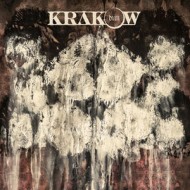 I’ve read a lot lately about this experimental post metal band from Norway. Most of it has been of a complimentary nature. This is their second album release, following “Monolith” (2008) which gives a good clue. “Bleak” would be an apt title but the band has opted for “diin” instead.
I’ve read a lot lately about this experimental post metal band from Norway. Most of it has been of a complimentary nature. This is their second album release, following “Monolith” (2008) which gives a good clue. “Bleak” would be an apt title but the band has opted for “diin” instead.
After setting out with a familiar mix of searching sounds, the album moves into less familiar territory with “Future Past”. A chugging and desultory sound is matched by spaced out vocals. In fact the sound is reminiscent of industrial process. The bleak instrumentals are reinforced on “Termination of Origin”. There’s expansion, fading sounds as if the wind is taking the vocals and guitar rhythms off course. Slow and steady is the order of the day. For me, this album was more about mental patterns and endurance than the onset of the apocalypse, which can go with this style. More industrial processes follow on “Mound”, whose repetitive greyness are mirrored by the murky splattering of thumb prints depicted on the album’s sleeve. The intense repetition is evidently something that we, the listeners, become absorbed in but I just didn’t feel that way about this particular slab of industrial-sounding monotony.
Cult of Luna, with whom comparison can be made, manage to suck me in with their overpowering drums and crashing chords but this reminds me of the time I went to Scunthorpe and dispassionately watched steel being processed. Admittedly there were no anguished vocals in Scunthorpe, and there was no heightened drama as there is here but the sound enhancements which surround “Mound” lack definition or colour. This may well be deliberate but it didn’t add to my listening experience. I preferred the following track “Mark of Cain”, which is stronger all round thanks to an eerie coldness running through it, more pronounced drum work and sustained guitar chords which match the floating mixture of moods. “Possessed” and “Into the Distant Sky” both sound like a cry for help. The latter is more extreme, clanging as it does through a canvas of metal sounds, but again my vision was limited to a dark, industrial world with no context beyond that.
Band names don’t normally concern me, but it crossed my mind that perhaps “Scunthorpe” should have been chosen as the band’s name rather than “Krakow”, which is quite a pleasant place. But then “Scunthorpe” doesn’t have the spookiness of nearby South Killingholmewith its oil refineries, chemical plants and wind whistling through the surrounding fields. Yes, “South Killingholme” as a band name would match the music better.
Moving back to reality of sorts, the nightmarish floatiness of “Future Past” reappear on the disturbing and suggestively anarchic “Omen”. There is melody and yet it’s creepy like a black metal track. The combinations are deep and impressively powerful in a way that I hadn’t heard to this point. Its echoing end is doom-laden and intensive enough to suggest that something very bad is going to happen. All that remained was “Sense of Space”, something I had been grappling with throughout this work. I still wasn’t clear what I had found. “Sense of Space” lumbers along distortedly with a dull pitch. There are some unusual sound effects but by the time it ended, I didn’t feel particularly enlightened.
The problem with being gloomy and grey is that it’s difficult to invite in colour and intensity without contradictions. It’s like trying to depict reality – uninteresting, really. “diin” isn’t about reality and it doesn’t have contradictions because Krakow stick to a grey and mostly mechanical route, which for all its wanderings, did not have enough points of special interest for me.
(6 /10 Andrew Doherty)

Leave a Reply